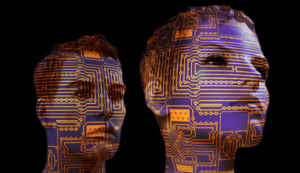By Jiaying Zhao, Yuen Pau Woo, Lorne A. Whitehead
See original post here.
The recent explosion of artificial intelligence (AI) has the potential to revolutionize the workforce. ChatGPT reached 100 million users in just two months after its launch. It and other generative AI applications have the potential to increase the efficiency of more than 50 per cent of all worker tasks in the U.S., with no loss in quality. A recent report estimates that AI’s boost to labour productivity can increase annual global GDP by seven per cent over a 10-year period.
The widespread application of AI could, however, displace 300 million full-time jobs, especially those that involve writing, programming, routine repetitive work and information processing. For example, the work of journalists, writers, interpreters, analysts, accountants, software engineers and mathematicians could be reduced by at least 50 per cent.
Statistics Canada suggests that 40 per cent of Canadian workers are at a moderate or high risk of job transformation because of AI. In China alone, AI deployment could render over 50 million workers obsolete and in need of retraining. In the U.S., the figure is around 11.5 million.
AI will create tremendous wealth for some, but income loss for many more, and will likely exacerbate the problem of income inequality.
Is a basic income the solution?
A basic income (BI) would provide each adult with unconditional regular cash payments to help cover basic living costs, with the goal of reducing poverty and income inequality (while recognizing that payments to higher earners would be taxed back). This idea has garnered strong support from the AI industry.
Sam Altman, CEO of OpenAI, which created ChatGPT, has championed a BI approach called the American Equity Fund, which would provide all adult citizens annual unconditional cash payments funded by taxing certain companies 2.5 per cent of their market value each year and by taxing 2.5 per cent of the value of all privately held land. Altman’s belief is that a BI can be part of a new social contract that will raise the income floor for people living in poverty. Mustafa Suleyman, co-founder of DeepMind, has also expressed his support for a BI and insisted that governments provide material compensation to people who will lose their jobs due to AI. And Elon Musk has endorsed Andrew Yang’s freedom dividend, which proposes that the U.S. government give every American adult a monthly US$1,000 benefit to offset job loss due to automation.
Beyond the AI industry, the public has also shown overwhelming support for a BI. In recent polls, 59 per cent of Canadians support a basic income of $30,000, and 57 per cent agree that the government should create a BI for all Canadians, regardless of whether they work. In the U.S., 67 per cent of Americans (82 percent of Democrats, 48 per cent of Republicans) support a basic income of US$1,000 per month.
However, some critics claim that a BI would introduce complexity in social services, could not reach vulnerable populations that do not file taxes and would be prohibitively expensive. Other concerns involve fears that a BI would be a disincentive to working and would create inflation. The IRPP recently published a book espousing some of these concerns, building on a 2020 report on the feasibility of a BI in British Columbia. The report rules out a BI on the grounds that unconditional income transfers violate a particular view of “a just society” and proposes that targeted programs are a more efficient way to reduce poverty.
Substantial evidence suggests that these concerns are not valid. First, experiments involving a BI have resulted in a wide range of positive outcomes on education, health, entrepreneurship, social integration, subjective well-being, assets and housing with no significant increases in spending on temptation goods like alcohol and drugs.
Second, the universality of a BI could reduce administrative costs compared to targeted programs that are encumbered with complicated means-testing requirements. However, how a BI intersects with existing social services (e.g., disability assistance, income assistance and child support) needs to be carefully thought out. One question to consider is whether some existing services may need to be redesigned or eliminated altogether, but it certainly does not mean a BI would complicate social services.
Third, a BI can reach virtually everyone through channels other than the tax system. For those who do not file taxes, a BI presents an opportunity to integrate marginalized individuals into the financial system by providing them with free ID replacement services, free chequing accounts and free mobile phones, so that people can open accounts and receive payments, as demonstrated by many cash-transfer programs. Furthermore, the move to automatic tax filing for low- or zero-income earners – recently given a boost in the 2023 federal budget – will progressively make it easier to use the tax system to deliver a BI benefit.
Fourth, a BI can in fact reduce the fiscal burden on the government because citizens who become financially independent will rely less on social and health services. A recent study of unconditional cash transfers to those experiencing homelessness shows that carefully designed programs can be cost-effective and generate net savings. Another study looking at the social and other downstream benefits of a BI arrived at the same conclusion. Furthermore, Canada’s Office of the Parliamentary Budget Officer has estimated that the $88-billion cost of a BI (based on a $17,000 benefit for a single person) could be offset by scaling back tax credits that disproportionately benefit higher-income individuals and corporations.
Fifth, a BI has little negative impact on the labour supply. In fact, a recent review shows that a BI increased the global labour supply – men and women, young and old. A slight but insignificant reduction in the labour supply was found in workers who were children, the elderly, the sick, those with disabilities, women with young children, and young people who continued their schooling after receiving a BI. One of the largest BI programs in the world, the Alaska Permanent Fund Dividend, has had no effect on employment and has increased part-time work by 17 per cent.
Finally, a BI is unlikely to cause inflation. A theoretical analysis shows that a BI involves the redistribution of money and does not entail printing more money or a shortage in the supply of goods. Empirical evidence suggests that existing BI programs have not caused inflation; Alaska has had lower inflation than the rest of the U.S. since implementing the Alaska Permanent Fund.
Canada’s leadership role
Canada is uniquely well positioned to be a global leader in BI and AI. Bill S-233 (An Act to develop a national framework for a guaranteed livable basic income) is being considered in a committee of the Senate. In Prince Edward Island, there is cross-party support for a proposed BI pilot in the province.
In addition, several BI trials have already taken place in Canada, including the Manitoba basic annual income experiment in the 1970s and the Ontario basic income pilot in 2018. Both experiments showed promising results, including better personal relationships, a greater sense of inclusion and citizenship, and significant improvements in recipients’ standard of living, cognitive function and subjective well-being.
Canada is also a leader in AI, which could make the user interface with the system of public assistance profoundly individual, respectful, responsive, and personal – by freeing up staff time to focus on personal interactions where needed.
And Canada is a leader in social innovation, and the right size to take a decisive leadership role in this key aspect of human well-being.

















